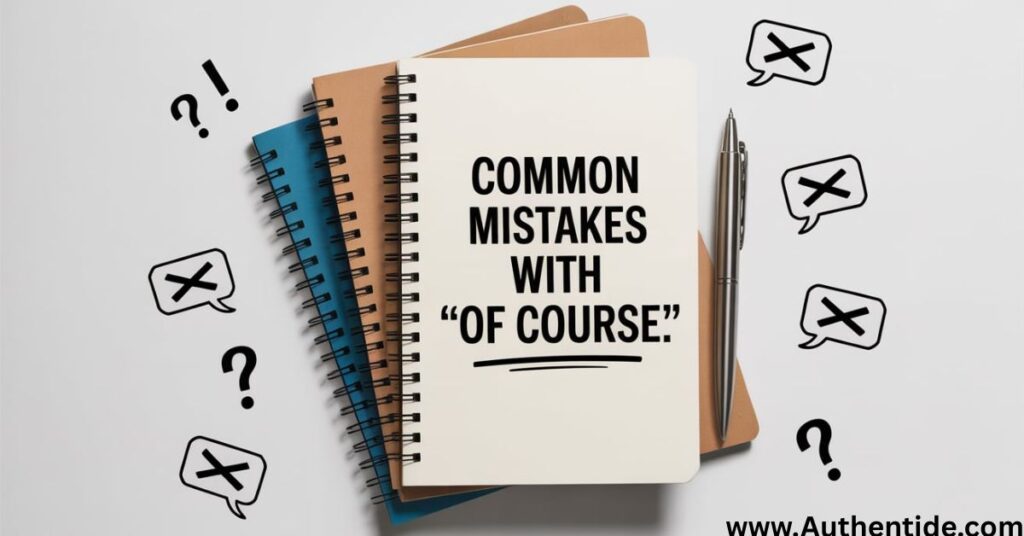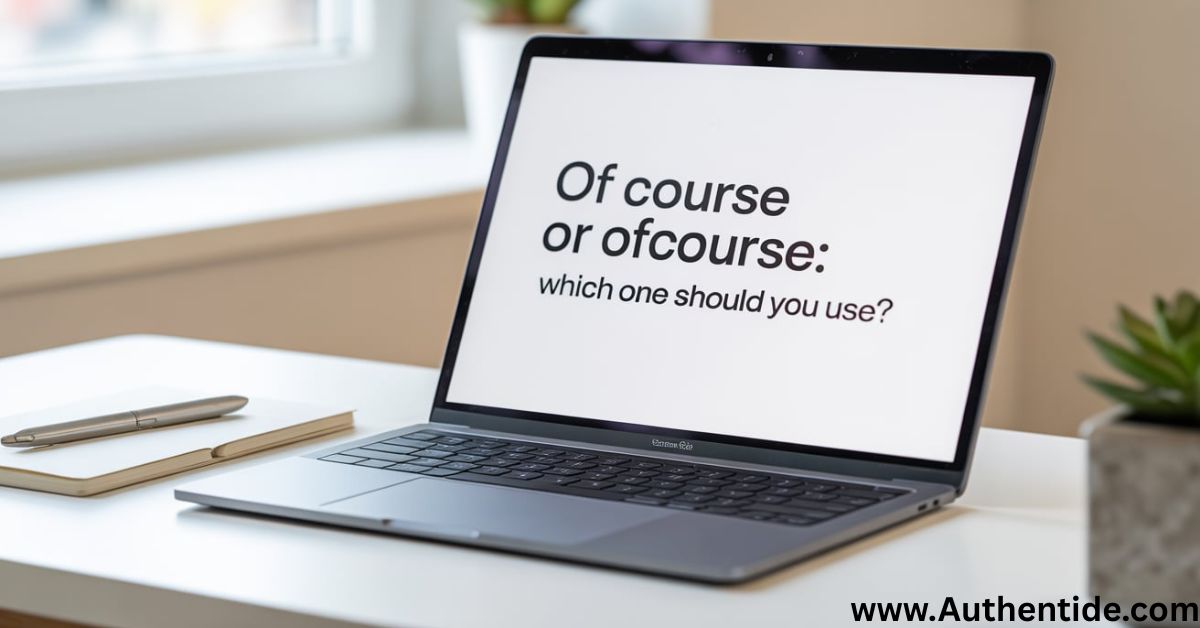Of course: which one should you use? This question jumps off the page, grabbing attention immediately. Most people mistype “of course” as “of course”, thinking it’s acceptable, but in reality, the two aren’t interchangeable. Let’s dive into why that separation of + course matters so much for clarity, correctness, and even credibility in your writing.
Every day, writers and students face spelling confusion, swapping between “of course,” “of course,” and even “off course spelling.” Mistakes here may seem minor, yet they reveal deeper gaps in understanding grammar and correct English usage. What you write reflects how well you know language, so nailing course-correct spelling shows polish and professionalism.
You might wonder: which is correct, of course or course? The answer isn’t just about what looks right, it is about meaning and tone in context. In this post, you’ll explore the meaning of course spelling, and whether it’s of course or course, and get pro tips for avoiding frequent mistakes once and for all.
First Paragraph
Of course stands apart from of course not only visually but grammatically, and this tiny space between “of” and “course” carries weight. People who type “of course spelling” often do so because they’ve seen it floating around online. Yet every reputable dictionary, grammar guide, and style manual treats of course correct spelling as the only valid form. In short, is it, of course, a word? No, it isn’t recognized in standard English grammar. That misplaced closure turns an everyday phrase into a typo, one that can undermine writing clarity and professionalism.
Understanding the Difference: Is it of course or course?
What Does “Of Course” Mean?
“Of course” is a standard phrase used to indicate something is obvious or expected. Think of it as shorthand for “as naturally as a course follows a path.” Meanwhile, is it of course correct? No this form doesn’t appear in dictionaries or formal usage guidelines.
Why “Of course” Spelling Is Incorrect
Typing of course as one word muddies grammar and makes your work look sloppy. It’s a frequent example of spelling confusion, especially among non-native speakers or casual writers. Remember: the grammar, of course, is simply wrong. There’s no rule saying “of course” should ever be accepted.
Grammar Guidance: Is of course a word?

In proper grammar, “of” is a preposition and “course” is the object. Together, they form a phrase not a compound word. For clarity, grammar, of course, doesn’t permit merging them. English spelling rules favor two-word pairings in many set phrases, and this one fits that rule. So if you’ve wondered, is of course a word, the answer remains firm: it doesn’t meet standard usage.
When to Use “Of Course” vs. “Of course”
Use “of course” whenever you want to say something is expected, promised, or obvious. Avoid “of course” in any writing, formal or informal. While text messages may slip it in, any professional writing from emails to blog posts demands precision. If someone asks, of course, meaning, refer them to “of course,” period.
Scenario Examples
- Email Example (business)
Subject: Meeting tomorrow
Hi Jane,
Of course, I’ll be there at 10 a.m. Let me know if, of course, spelling is still giving you trouble. See you then. Regards, Mike - Casual Text
“Of course, I’ll grab coffee later 😂”
Here, “of course” sounds conversational. If someone wrote “of course I’ll grab coffee,” it just looks like a misspelling. - Blog Post Snippet
“Many learners wonder: which is correct, of course or course? Trust me, it’s always two words. Understanding this avoids common grammar mistakes.”
Common Mistakes with “Of Course”

People often type off-course spelling by accident a confusion of pronunciation (“off course”) with the correct phrase. Others mix it with is, of course, correct, hoping to validate the one-word form. None of those are valid in everyday English usage. These fall under commonly confused words and show up in grammar tip lists for word choice in writing.
Avoid Misuse (Most Important Paragraph)
Here’s the most crucial section, so treat it like a friendly grammar whisper:
Always type “of space course” no exceptions. Before hitting send, scan your text for “of course grammar issues.
Use your word processor’s spell-check dictionary or add custom autocorrect to flag “of course” as wrong.
When reading others’ writing that uses “of course,” mentally correct it to “of course” to reinforce the separation in your brain.
Practice with example sentences. Write down ten simple sentences using “of course,” like: “Of course I finished the report.” Repetition helps solidify proper writing habits.
Think of it like this: your brain’s autopilot often rewrites “of course” incorrectly. By consciously catching it, you retrain your muscle memory. These tips transform repetition into near-effortless accuracy, which, in turn, improves writing clarity and confidence.
Synonyms and Similar Terms to “Of Course”
- Naturally
- Absolutely
- Certainly
- Definitely
These alternatives mirror the meaning of “of course,” and can spice up your writing if you feel like avoiding repetition.
When Not to Use “Of Course”

Sometimes, you might mean “off course”—like when a ship veers off its route. That’s a completely different phrase. Don’t confuse “off course spelling” (entered as a typo) with “of course.” They sound alike but belong to different contexts. Keeping them distinct shows your attention to detail.
Scenario Examples in Context
| Situation | Example Sentence |
|---|---|
| “In writing clarity, of course, correct spelling beats sloppy mistakes.” | |
| Text conversation | “Of course I’m coming tonight!” vs “Of course I’m coming tonight!” |
| Blog paragraph | “Of course I’m coming tonight!” vs “Of course I’m coming tonight!” |
Language Learning Confusion: Why It Happens
Many learners collapse two-word phrases into one because they hear them fast in speech. That’s everyday English phrase processing for you. Without conscious correction, they internalize errors. But once you spot that misstep “of course spelling” vs. “of course” you gain writing clarity and avoid misunderstanding in English.
Conclusion
In a nutshell, “of course” is the only correct English usage, while “of course” always reads like an error, never a valid word. Whether you’re writing an email, blog post, or essay, choosing the two-word form reflects proper grammar, correct word usage in sentences, and attention to detail. Remember the spelling of course is non-negotiable. Ten sentences practiced with intention will help fix that common grammar mistake once and for all. Use it correctly. Write confidently. And let your readers know you know your English.

Your go-to place for smart synonyms and celebrity updates. Muhammad Hassan Abid is dedicated to creating useful, engaging content that informs, inspires, and truly serves your curiosity

